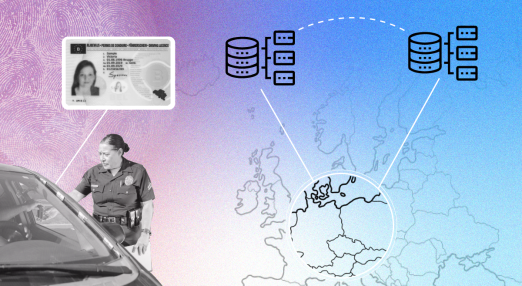data collection
Filter by...
-

The two sides of web scraping: When data collection becomes a double-edged sword
Emerging AI technology often relies on methods of data collection – such as web-scraping – which can become a double edged sword when not used with safeguards and transparency or in ways that are unlawful. These methods have been used to achieve several key victories for digital rights, but can also be exploitative.
Read more
-

USA border plan requires “continuous and systematic” transfers of biometric data
Last year, it was revealed that the USA planned to launch Enhanced Border Security Partnerships (EBSPs) with other states around the world, seemingly targeting the EU, UK and Israel first. These would involve “continuous and systematic” transfers of biometric data to the USA for the purposes of immigration and asylum vetting, says a recent Council of the EU document obtained by Statewatch.
Read more
-

TrustPid: Baking ad tracking into the internet infrastructure
A consortium of Europe’s largest telecommunications operators (telcos) has proposed a new kind of tracking ads system to challenge commercial surveillance heavyweights like Google and Facebook. The new tracking system, misleadingly dubbed ‘TrustPid’, would be baked into the internet’s network infrastructure – potentially with little recourse or defence for users.
Read more
-

Position Paper: New EU law amplifies risks of state over-reach and mass surveillance
The EDRi network published its position paper on the proposed Regulation on automated data exchange for police cooperation (“Prüm II”). The European Commission’s Prüm II proposal fails to put in place vital safeguards designed to protect all of us from state overreach and authoritarian mass surveillance practices. In the worst case scenario, we may no longer be able to walk freely on our streets as the new law would treat large parts of the population as a criminal before proven otherwise.
Read more
-

Bits of Freedom files a complaint against intelligence services on behalf of millions of citizens
The Dutch secret services are illegally storing the data of millions of citizens. The supervisor does not have the means to do anything about this violation of the law, so EDRi member Bits of Freedom filed a formal complaint. It is high time that the secret services started to abide by the law. Our data should be removed from their servers.
Read more
-

When the political party votes for you: Can we have a fair election with surveillance political advertising?
A new regulation on online advertising was proposed last December to address political ads, which identifies in one definition, two techniques to deliver political ads: targeting and amplification.
Read more
-

IuRe teams up with journalist to sue the Czech state for mobile phone data collection
The Czech state has been collecting data on the mobile communications of all its citizens. While the content of the communication remains unknown, other types of data are stored for six months through telecommunication operators. The stored data includes information on phone traffic and the locations of the internet connection. However, according to EDRi's member Iuridicum Remedium (IuRe), such large-scale data collection conflicts with European legislation. Therefore, together with investigative journalist Jan Cibulka, it has decided to sue the Czech state and demand an apology for illegal data collection.
Read more
-

Why EU needs to be wary that AI will increase racial profiling
Central to predictive policing systems is the notion that risk and crime can be objectively and accurately forecasted. Not only is this presumption flawed, it demonstrates a growing commitment to the idea that data can and should be used to quantify, track and predict human behaviour. The increased use of such systems is part of a growing ideology that social issues can be solved by allocating more power, resources - and now technologies - to police.
Read more
-

Targeted Online: How Big Tech’s business model sells your deepest secrets for profit
Surveillance-based advertising which is currently the business model used by Google, Facebook and many others is harmful to people and to society as a whole because it encourages the spread of disinformation. It's also bad for the media who lose control of their ad space and suffer from decreasing revenue as a result.
Read more
-

The companies in control of our secret identities
EDRi member Privacy International published a research on ad tech companies' data collection practices which are employed to create an assumed picture of you. The study shows that the profiles created for the data subjects are based on information pieced together from incomplete data and using marketing algorithms. Hence, this data forms an uncanny picture of yourself, one that you may not have voluntarily revealed, a digital shadow over which you have very little practical control.
Read more
-

When the police’s IT-systems are not in order, everyone loses
Without the trust of citizens, the police cannot do their job properly. That is why it is important that the police are extremely careful with citizens' data. But an analysis by EDRi member Bits of Freedom shows that of all 36 'mission critical' systems of the police, not one complies with the rules on privacy and information security.
Read more
-

Google: seizing a crisis to legitimise mass surveillance?
Even in times of Corona, Google follows you wherever you go. The company collects and processes all our location data en masse and can thus graph how well we adhere to the imposed measures.
Read more
